Maritime Agencies
Collaboration, Partnerships Essential For Blue Economy To Flourish, Says Capt Sunday Umoren.
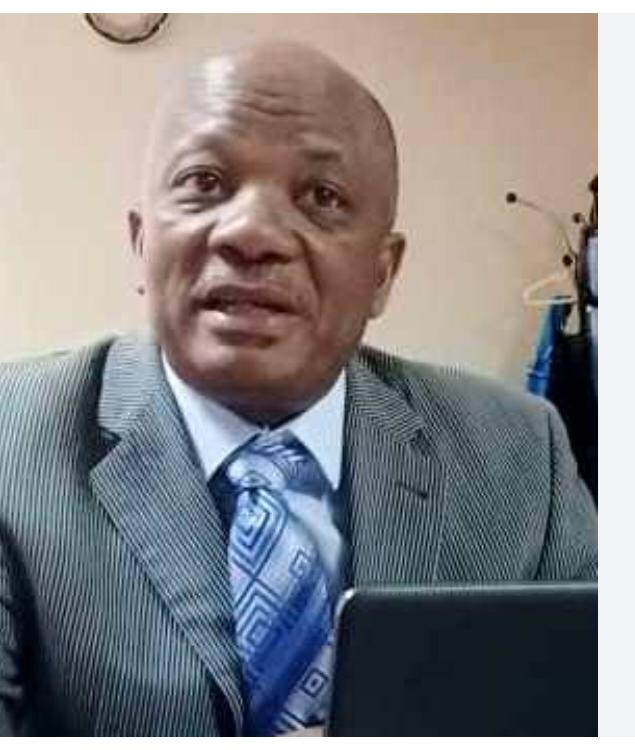
By Izuchukwu Ozoemena
Collaboration, partnerships cannot be taken away while exploring how to make the best out of the blue economy.
Secretary-General, Abuja Memorandum of Understanding on Ports State Control (Abuja MOU), Capt Sunday Umoren stated this while featuring at the 4th annual symposium and workshop of the African Marine Environment Sustainability Initiative in Lagos, Tuesday, on the theme: ‘Achieving Blue Growth in a Changing Climate’.
Discussing the topic ‘Collaboration and Partnership in Driving Blue Economy,’ Umoren said collaboration and partnerships provide the only means of actualizing the prospects of the Blue Economy.
Collaboration and partnerships, he emphasized, could cover funding, marketing, shareholding, technology, sustainability, conservation, policy formation and innovation. Other areas include research and development, logistics, off-taking, and any other area of mutual agreement. Collaboration should be regulated with international best practices that partners will most likely flow through and be guided.
“The legality should cover the maximum % share of ownership, employment, repatriation of funds and guided by the principle of fairplay and equity.”
The advantages of collaboration and partnership, he stated, are reduced transaction costs and specialization, utilization of complementaries, utilization of local rivalry, technological transfer, innovation and international competitiveness. Business profitability, growth in size and internationalization also come in various categories – local, private, national and international; inter-governmental, JVs, Regional Cooperation (ECOWAS/ECCAS, AU, Abuja MoU, GMAC (Green Maritime Africa Coalition), the Lake Victoria Fisheries Organization (LVFO), etc.
These involve regional intergovernmental organizations that can promote economic integration and cooperation among member states.
Sustainable fishing, marine resource management and environmental conservation can benefit from such arrangement, he explained.
ICCAT is a regional fisheries management organization responsible for the conservation of tunas and tuna-like species in the Atlantic Ocean and adjacent seas established by the International Convention for the Conservation of Atlantic, Tunas, in 1966.
On public-private partnerships, (PPPs), governments partner with private enterprises to invest in sustainable fishing practices, eco-tourism, and renewable marine energy. These partnerships can provide funding and innovative technologies.
Also, involving local communities in decision-making ensures that initiatives reflect their needs and knowledge. Programs often focus on sustainable fishing practices and marine conservation efforts, empowering local stakeholders.
In the area of research and academia, partnerships with universities and research institutions facilitate data collection and analysis essential for informed policy-making.
Collaborative research initiatives help address local challenges such as biodiversity loss and overfishing.
Engagement with international organizations (like the UN, IMO, ILO, World Wildlife Fund (WWF), and NGOs enhances funding opportunities, technical support, and the sharing of best practices for sustainable marine management.
Capacity building training programs for local communities, fishermen, and government officials are vital for fostering skills in sustainable practices, marine resource management, and conservation efforts.
Collaborative efforts to share technology can also enhance the monitoring of marine resources, improve fishing practices, and support the management of marine- protected areas while innovations such as satellite tracking and data analytics play a significant role.
Partnerships focused on climate resilience, helping coastal communities adapt to changing environmental conditions, and integrating ecosystem-based approaches into development planning are also germaine.
Sound policies are crucial to a sustainable blue economy while proper collaboration of all stakeholders ensures that good policies are formed to drive the economy.
“There can be no successful impact of the blue economy without a strong
ennforcement drive. The exploitation and exploration of the oceans have the potential to have a great impact on the nation’s revenue and GDP.
” However, the ocean faces multiple challenges due to increasing pressure from human actions and impacts, e.g. over-exploration, over-exploitation, plastic pollution, overfishing, ocean acidification, etc. These actions and many more are a clear contravention of the U.N. Sustainable Development Goals (SDGs)”.
Conserve and sustainably use the oceans, seas and marine resources for sustainable development, he advised.
Restoring sanity in the maritime domain requires responsible operators mostly achievable through ‘enforcement’.
Enforcement could be through a
review of the constitution,
the Merchant Shipping Act and other related acts and regulations.
Strong legal backing with reward and consequence management,
empowerment of law enforcement agencies with clear delineation of powers and authority (Coast Guard, Marine Police, Navy, and others),
strong regulatory authorities, Flag State, Port State, Revenue and Licensing authorities also have critical roles to play.
Silo mentality, he stated, will lead nowhere. It is therefore important to dwell on interdependence which has been time-tested.
“We grew up hearing the adage ‘the sky is wide enough for all stars to shine,’ but today I will implore you all to rephrase it to ‘the sea is wide enough for all stars to shine and glow.’
Capt Umoren called for attention on business growth and investment opportunities. Nations should also act responsibly as they focus on SDG 14 – sustainable ocean use (the Blue Economy).
Maritime Agencies
CVFF Acruals Safe and Intact, Says NIMASA DG, Mobereola.
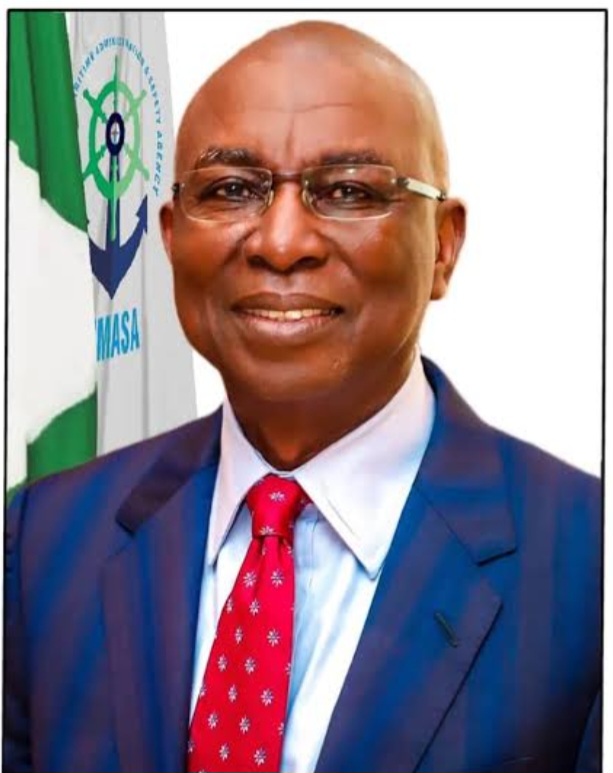
By Izuchukwu Ozoemena
Contrary to the impression being bandied in certain quarters regarding the safety of the Cabotage Vessel Financing Funds (CVFF), the acruals remain intact and secure in the vaults of the Central Bank of Nigeria and her Single Treasury Account (TSA) arrangement.
Dr Dayo Mobereola, the Director-General, Nigerian Maritime Administration and Safety Agency (NIMASA) gave the update, November 19 in a release by the agency.
According to the Director-General, the update has become necessary to refute misleading publications alleging that the funds have disappeared from the CVFF account.
“The report of missing money is both misleading and false”, the agency’s Assistant Director of Public Relations, Edward Osagie explained in a press statement.
“For the record, the Cabotage Vessel Financing Fund, securely held in the NIMASA account at the Central Bank of Nigeria (CBN), remains intact. There has been no disappearance of funds, and no illegal transactions, as the article suggests.
“This misinformation is a figment of the author’s imagination aimed at undermining NIMASA’s integrity, and mislead the public about the Agency’s operations.
“The Management of NIMASA will ensure that the CVFF is utilised in line with its statutory purpose”, the
NIMASA Director General stated.
Mobereola was emphatic about the state of the funds and assured stakeholders of the safety under the CVFF.
“Let us be clear that the CVFF account at the Central Bank of Nigeria is safe, intact, and secure. We at NIMASA will continue to manage it with the utmost responsibility, and there are no irregularities or illegal activities surrounding the funds”
He urged the public to disregard any false narratives and to continue trusting the Agency’s ability to uphold the integrity of Nigeria’s maritime sector.
The CVFF is a fund established under section 42 of the Coastal and Inland Shipping (Cabotage) Act 2003 to promote the development of indigenous ship acquisition capacity and to provide credit facilities to local maritime operators.
NIMASA, the release assured, is committed to transparency, accountability, and the advancement of Nigeria’s maritime sector.

Maritime Agencies
OGUN 1 CUSTOMS: CAC Ojo Bows Out, Hands Over To DC Shuaibu
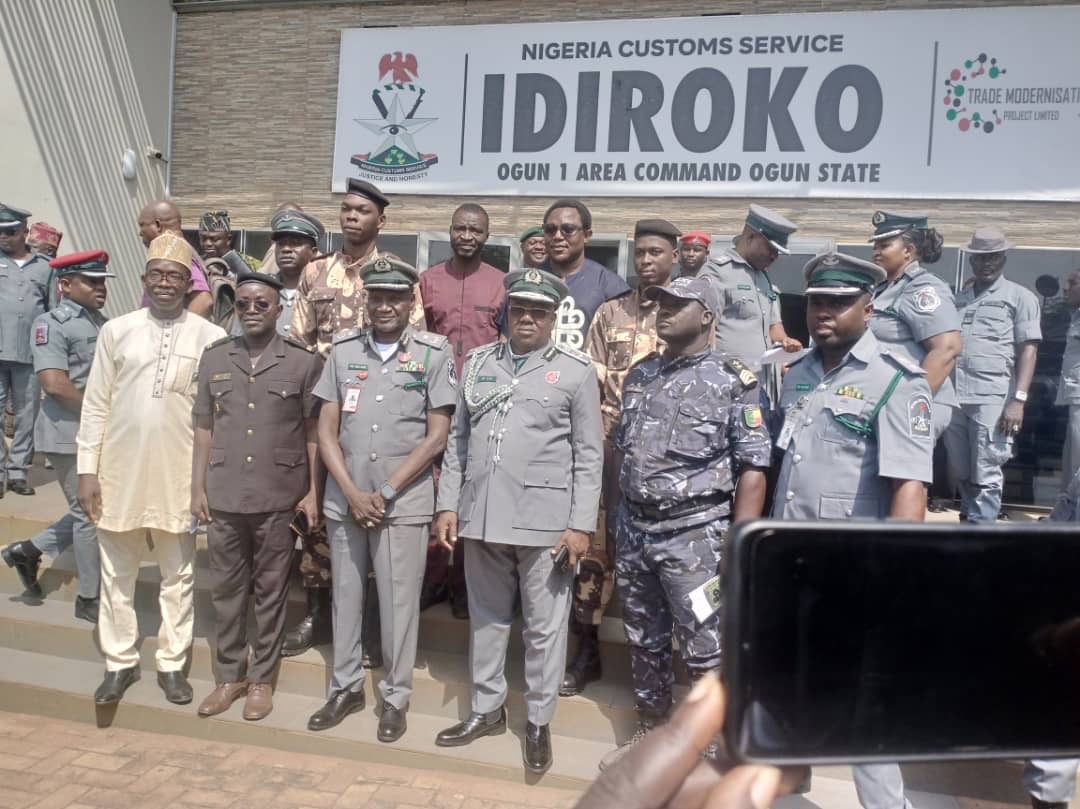
By Izuchukwu Ozoemena
In a colourful and well-attended event, Tuesday, the Ogun 1 Command of the Nigeria Customs Service celebrated the retiring Customs Area Controller, Comptroller James Ojo. His successor, DC MS Shuaibu also received encomiums for being found worthy to take over the mantle of leadership.
Following official redeployments and movements across Customs Commands earlier in the year, it is recalled, DC Shuaibu temporarily held sway at the Ogun 1 Area Command, Idiroko. Last April, however, he handed over the reigns to Comptroller James Ojo who was newly deployed to head the Command and left to assume duties as the Coordinator of the now-disbanded Joint Border Patrol Team Sector 2, Southwest.
But now the table has turned, retiring Comptroller Ojo handed over the leadership baton to DC Shuaibu at the Ogun 1 Command, Idiroko.
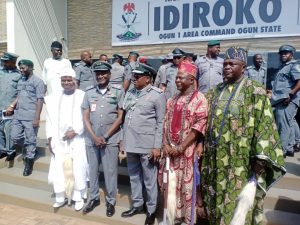
Speaking at the brief but impressive handing-over ceremony, Comptroller Ojo expressed gratitude to officers and men of the Command for the massive support and cooperation he enjoyed during his stint at the Command.
“Under my watch,” Comptroller Ojo stated, “this Command has not only enforced our mandate of revenue generation, border security and trade facilitation but has also made strides in building stronger collaborations with sister agencies and stakeholders. Together, we have intercepted illicit goods, curbed smuggling and facilitated legitimate trade. Our collective efforts have positioned the Ogun 1 Command as a key player in Nigeria’s economic and security architecture. As I retire, I must express my profound gratitude to the Comptroller General of Customs for the trust reposed in me and for providing the support that enabled the Command’s successes.”
In his remarks, DC MS Shuaibu, the newly deployed controller, applauded Comptroller James Ojo for leaving a legacy of resilience, collaboration and notable achievements.
He pledged to deepen the commitment to prioritizing teamwork, innovation, and discipline among officers and men of the Command.
“I call upon all officers and stakeholders in the Command to join me in this renewed effort as the task ahead is daunting. But with unity, dedication and the grace of God, we can surmount every challenge.’’
He promised to strengthen and maintain collaboration with sister- agencies so as to ensure border security and facilitate legitimate trade.
The handing-over ceremony was attended by a cross section of notable traditional rulers from Idiroko area and beyond. Senior officers from sister-agencies in Nigeria and neighbouring Benin also graced the occasion.
Maritime Agencies
FIGHT AGAINST BANDITS, INSURGENTS: ‘We’re Recording Huge Success’, Says Matawalle.
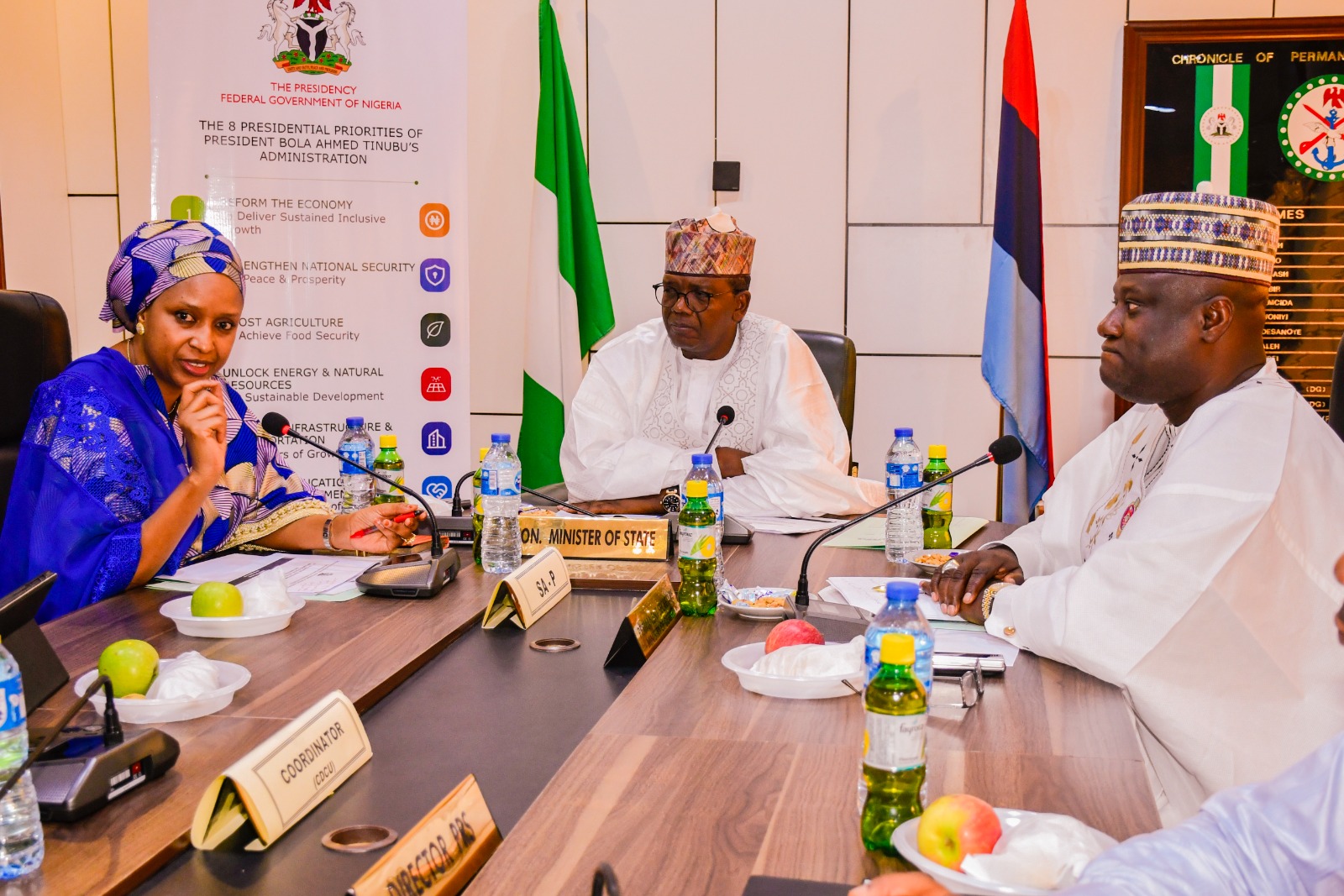
By Izuchukwu Ozoemena
Since the advent of the President Tinubu administration, the Nigerian Armed Forces have achieved a lot in the fight against insurgents, bandits and other groups that are enemies of the Nigerian State.
But for security and strategic reasons, a lot of these successes cannot be made public in order not to expose to danger the gallant men and women of the Armed Forces in the forefront of this fight.
Minister of State for Defence, Dr. Matawalle disclosed this during an engagement with Hadiza Bala Usman, Special Assistant to the President on Policy and Coordination/Head of Central Result Delivery Coordination Unit (CRDCU).
Hadiza Bala Usman was at the Ministry of Defence to present the 2024 1st-3rd Quarters Performance Assessment Report on Implementation of Presidential Priorities and Ministerial Deliverables at the Ship House, Abuja.
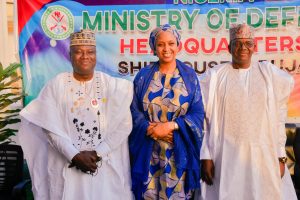
The Minister also informed the SA to Mr. President that before now, the Nigerian airwaves were always full of news of oil theft, bunkering, piracy and all forms of kidnapping. But since they assumed office, the country has recorded low occurrence and reduced reports of those activities just as he assured Nigerians of their resolve to do more to make the society safe for all.
Matawalle assured Hadiza Bala Usman of early submission of achievement data to her office for their reviews.
In a similar development, the SA to President advised the Ministry of Defence to put out more data into the public space to avoid doubts and negative feedbacks on the successes achieved by the Armed Forces in the fight against insecurity. She added that regional tour of the troubled areas could be conducted to carry out on-the-spot interviews and first hand assessment of rescued individuals whose response will serve as raw and real data to the populace and an evidence that government is not resting on its oars.
Speaking further during the review of the Q1 – Q3 Report, the Permanent Secretary Ministry of Defence, Dr. Ibrahim Abubakar Kana mni gave a detailed submission on the achievements of the Ministry and promised that the Ministry would do more to surpass previous quarter reports. He commended the Chief of Defence Staff and all Service Chiefs for their consistency and tireless efforts in making Nigeria a peaceful and safe place.
Dr. Kana tasked the Directors of the Ministry not to relax in their quest to give their best to the service of the country.
-
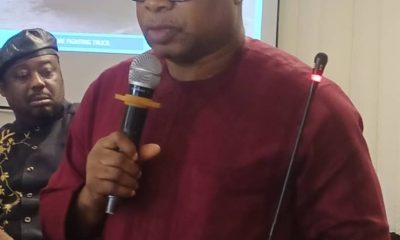
 Maritime Agencies3 weeks ago
Maritime Agencies3 weeks agoNIWA Regrets Kogi Boat Mishap After Massive Sensitization On Waterway Safety, Sets Up Inquiry
-

 Maritime Agencies3 weeks ago
Maritime Agencies3 weeks agoALLEGED MALTREATMENT: Seme Border Customs Sets Up Investigation.
-

 Maritime Agencies2 weeks ago
Maritime Agencies2 weeks agoOGUN 1 CUSTOMS: CAC Ojo Bows Out, Hands Over To DC Shuaibu
-
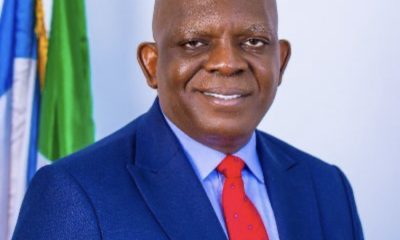
 Maritime Agencies3 weeks ago
Maritime Agencies3 weeks agoEXPORT: Shippers’ Council Directs Terminals To Stop Collecting Delivery Charges
-
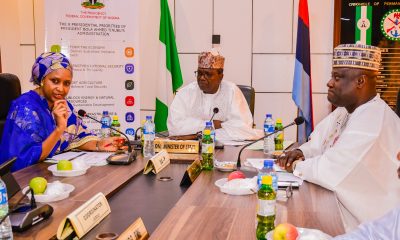
 Maritime Agencies3 weeks ago
Maritime Agencies3 weeks agoFIGHT AGAINST BANDITS, INSURGENTS: ‘We’re Recording Huge Success’, Says Matawalle.
-
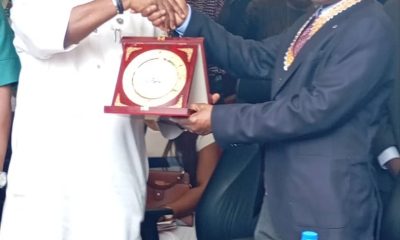
 Maritime Agencies3 weeks ago
Maritime Agencies3 weeks agoDantsoho, NPA Boss, Inaugurates MWUN Headquarters Annexe, Pledges Port Infrastructure Upgrade.
-

 Maritime2 weeks ago
Maritime2 weeks agoMatawalle Appeals For Restraint From Critics, Commends Tinubu For Economic Reforms
-

 Maritime Agencies3 weeks ago
Maritime Agencies3 weeks agoNIWA Implores States To Collaborate To Achieve Safer Inland Waterways



























